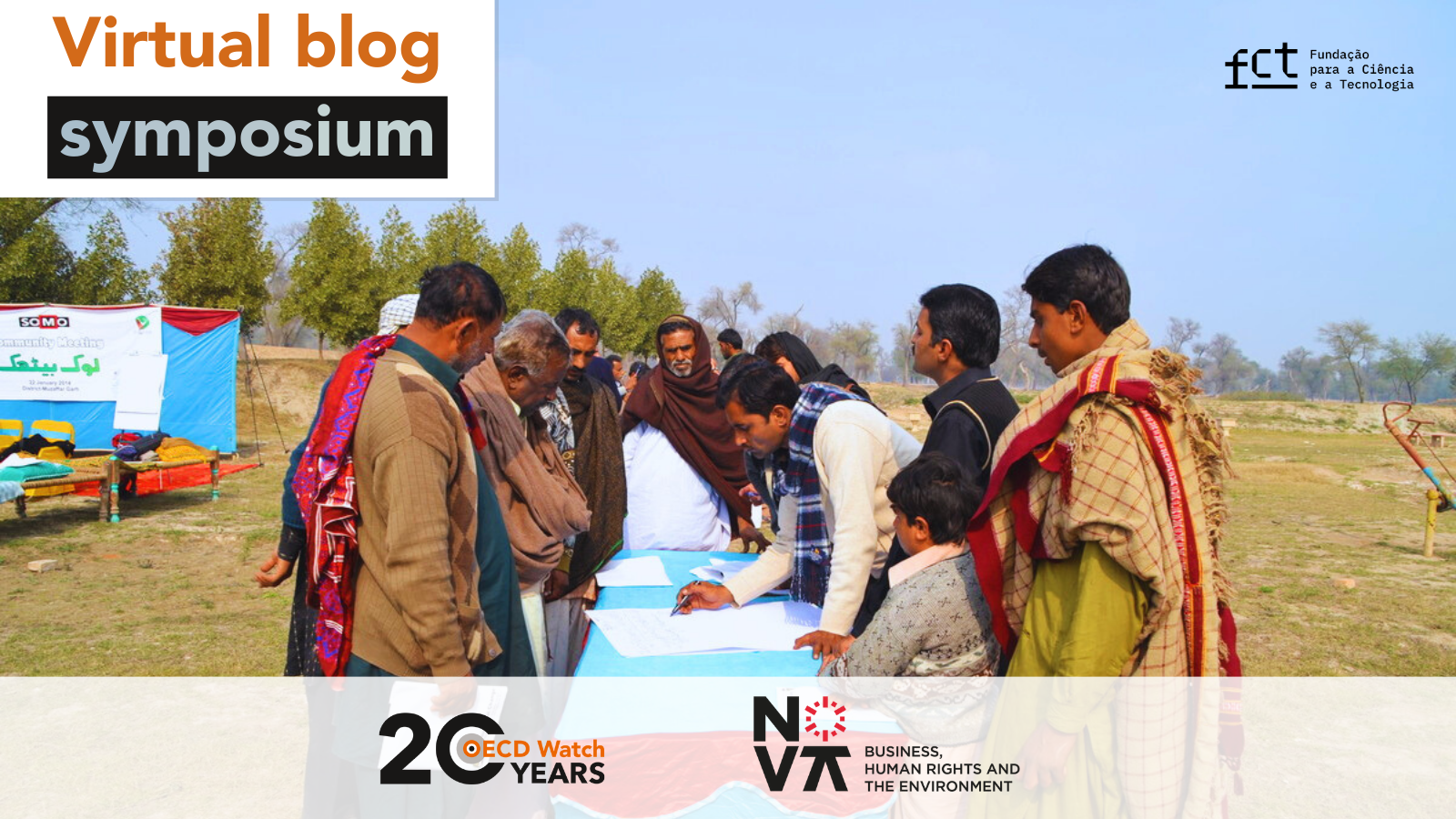About the author: Caroline Omari Lichuma is a Postdoctoral Researcher at the University of Luxembourg, where she carries out research in the broad area of BHR. She received her LLB from the Unievrsity of Nairobi, her LLM from New York University and her PhD from the Georg-August University of Göttingen.
This blog symposium is co-organised by OECD Watch and NOVA School of Law.
Introduction
12 years since the entry into force of the 2011 OECD Guidelines for Multinational Enterprises, (the 2011 Guidelines), a much-anticipated update has finally been implemented. At the 2023 meeting of the OECD council at ministerial level, the new OECD Guidelines for Multinational Enterprises on Responsible Business Conduct, (the 2023 Guidelines), were officially adopted. This significant development comes at a watershed moment when numerous comparable developments are concurrently taking place in the Business and Human Rights (BHR) sphere, including: progress towards an EU wide Corporate Sustainability Due Diligence Directive (CSDDD) as well as continuation of the drafting process of a UN treaty on BHR within the aegis of the Open-ended Intergovernmental Group on Business and Human Rights.
This contribution critically analyzes the 2023 Guidelines in order to unearth whether there have been any significant changes to the provisions on meaningful stakeholder engagement, especially as this relates to vulnerable stakeholders and those in marginalized positions.
Something Old..
The 2011 Guidelines had a number of provisions on stakeholder engagement. To begin with, in the General Policies section, guideline 14 (sub-section A, page 20) provided that companies must ‘[e]ngage with relevant stakeholders in order to provide meaningful opportunities for their views to be taken into account in relation to planning and decision making for projects or other activities that may significantly impact local communities.’ Commentary 25 elaborated that such engagement should involve interactive processes such as meetings, hearings or consultation proceedings and should be characterised by two-way communication in good faith.
While not directly dealing with the question of meaningful stakeholder engagement, section III on Disclosure in commentary 35 laid a useful foundation for such engagement by requiring companies to provide information, including to ‘communities that do not have access to printed media (for example, poorer communities that are directly affected by the enterprise’s activities).’ Section IV on Human Rights did not have any explicit reference to meaningful engagement with stakeholders. However, commentary 46 stressed that operational level grievance mechanisms can be a useful mechanism for those impacted by the enterprises’ activities and can be an effective means for remediation where they, inter alia, ‘are based on dialogue and engagement with a view to seeking agreed solutions.’ In section VI on the environment, guideline 2 (b) (page 42) recommended that the enterprise should ‘engage in adequate and timely communication and consultation with the communities directly affected by the environmental, health and safety policies of the enterprise and by their implementation.’
The 2011 Guidelines did not make any references to engagement with vulnerable or marginalized stakeholders or require companies to put in place any special measures in this regard.
Something New..
The 2023 Guidelines introduced a significant number of updates on how companies should engage with stakeholders (or their legitimate representatives), especially those in positions of vulnerability and marginalization. One key driver for these updates was to ensure that the 2023 Guidelines were more in line with both the OECD Due Diligence Guidance as well as the various OECD Sectoral Guidances, which contain considerable guidance to companies on how to meaningfully engage with stakeholders.
As regards the updates to the 2023 Guidelines, these will be highlighted in turn. The General Policies section provides in guideline 15 (sub-section A, page 15) that enterprises must ‘[e]ngage meaningfully with relevant stakeholders or their legitimate representatives as part of carrying out due diligence and in order to provide opportunities for their views to be taken into account with respect to activities that may significantly impact them related to matters covered by the Guidelines.’ This new formulation is more in line with the one spelled out in principle 18 of the United Nations Guiding Principles on BHR (the UNGPs) and notably introduces the idea of legitimate representatives. Commentary 14 builds on this recommendation by requiring companies to create a safe space where concerns about adverse impacts can be safely expressed, and where individuals or groups who share concerns will not face reprisals. Building on commentary 25 of the 2011 Guidelines, commentary 28 of the 2023 Guidelines stresses that stakeholder engagement is a key component of the due diligence process, and that in some cases it may even be a right in and of itself. This is a much stronger formulation than the one in the 2011 Guidelines, and elevates meaningful engagement to a right (in some cases), rather than an act of benevolence done by the company in disregard of the autonomy and agency of rightsholders. In addition, commentary 28 defines relevant stakeholders or their legitimate representatives as persons or groups ‘who have rights or interests related to the matters covered by the Guidelines that are or could be affected by adverse impacts associated with the enterprise’s operations, products or services.’ Given the realities of the difficulties inherent in stakeholder engagement where companies may have numerous diverse stakeholders, commentary 28 further specifies that companies ‘can prioritise the most severely impacted or potentially impacted stakeholders for engagement’ with the degree of impact on stakeholders informing the degree of engagement. A final noteworthy improvement introduced by this commentary is the elaboration of what companies can do to make stakeholder engagement meaningful and effective. This includes ensuring that engagement is timely, accessible, appropriate, and safe for stakeholders, and identifying and removing potential barriers to engaging with stakeholders in positions of vulnerability and marginalization.
Commentary 32 recommends that companies communicate responsible business conduct information ‘…which may be material to an investor’s decision making and which also may be relevant for a broader set of stakeholders…’ This is an important and necessary precursor to meaningful engagement, that allows stakeholders to be able to participate in these processes on a more informed basis, thus helping to address the power imbalances (informational asymmetry) between companies and stakeholders. Furthermore, unlike the 2011 Guidelines, and as a result of legislative developments in countries such as France and Germany, commentary 32 of the 2023 Guidelines specifically references the fact that ‘[s]everal jurisdictions allow or require the consideration of stakeholder’s interests.’ As per commentary 39 such information should be ‘easily accessible, user friendly, timely, accurate, clear and complete.’
Commentary 45 requires the enterprise to pay special attention to certain categories of persons ‘for example human rights defenders, who may be at heightened risk due to marginalisation, vulnerability or other circumstances, individually or as members of certain groups or populations, including Indigenous Peoples.’ Commentary 50 goes on to recommend that companies should consider distinct and intersecting risks when carrying out due diligence, especially as this relates to ‘individual characteristics or to vulnerable or marginalised groups’, and stresses that ‘[m]eaningful stakeholder engagement is important in this regard.’ Commentary 50 also urges enterprises to dialogue and engage with a view to seeking agreed upon solutions within the context of remediation for adverse impacts.
In section VI on the Environment, guideline 1 (d) requires enterprises to provide stakeholders with ‘adequate, measurable, verifiable (where applicable) and timely information’ and guideline 2 elaborates upon the need for meaningful engagement with relevant stakeholders. Commentary 72 subsequently stresses that such meaningful stakeholder engagement and communication with stakeholders such as ‘employees, customers, investors, suppliers, contractors, local communities, individuals or groups in situations of vulnerability or marginalisation, persons possessing special rights or legitimate tenure rights, and Indigenous Peoples, and with the public-at-large’ is ‘a component of due diligence and may also be required by law.’
The 2023 OECD Guidelines in the Shadow of the Draft EU CSDDD
As the above analysis shows, the 2023 Guidelines have significantly updated the provisions on stakeholder engagement, including by: introducing the idea of marginalized and vulnerable stakeholders; reiterating the need to avoid reprisals and to remove barriers to engagement; and setting out the criteria necessary to make such engagement meaningful and effective.
Some of these updates share similarities with a number of proposals in the various versions of the draft EU CSDDD, as captured primarily in the Lara Wolter’s draft and the Parliament draft. Whereas the Commission draft made no reference to the idea of vulnerable or marginalized stakeholders, the Parliament draft contains a number of proposals similar to the updates in the 2023 Guidelines. For instance, amendment 122 created a new Article 3 (1) (na) recognizing vulnerable rightsholders. Additionally, amendment 206 introduced a new Article 8 (d) titled ‘carrying out meaningful engagement with affected stakeholders’ outlining a number of requirements on how such engagement should be carried out. It should be ‘comprehensive, structural, effective, timely and culturally and gender sensitive,’ In addition, legitimate representatives of affected rightsholders should be involved where it is not possible to engage the latter. Notably, in order to redress the information asymmetry that is emblematic of the relationship between companies and stakeholders, covered companies are required to provide ‘comprehensive, targeted and relevant information to affected stakeholders.’ Companies are also required to identify and address barriers to engagement and ensure that participants are not subject to retaliation or retribution. The needs of vulnerable stakeholders must be given particular attention. In contrast, the council draft disregarded a number of important proposals in the Lara Wolter’s draft such as, inter alia, the concept of vulnerable stakeholders introduced in Amendment 79; the explanation of meaningful engagement in Amendment 80. On balance, the EU Parliament’s draft provides for a more robust meaningful engagement obligation than the Commision draft and the Council draft. However, any enthusiasm in this regard must necessarily be tempered as we await the final version of the directive that will be adopted at the completion of the trilogue process.
Conclusion
The battle to enhance corporate accountability for violation of human rights and the environment is being fought on multiple fronts. Developments in both soft-law regimes such as the OECD framework as well as hard-law regimes such as the EU CSDDD and the UN draft BHR treaty are cause for cautious optimism. Meaningful engagement is a crucial component of any attempts to reduce the corporate accountability gap. The 2023 OECD guidelines have laid the seeds for a more robust meaningful engagement process by companies. Only time will tell how these seeds will grow.
Suggested citation: C. O. Lichuma, ‘Meaningful Stakeholder Engagement 2.0.?: Tracing Developments in the Revised 2023 OECD Guidelines for Multinational Enterprises’, Nova Centre on Business, Human Rights and the Environment Blog, 24th October 2023


